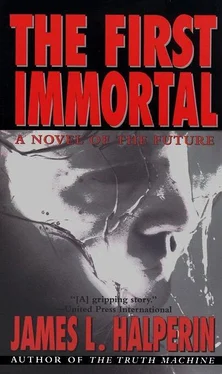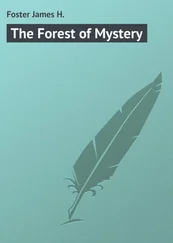“What percentage?”
“No one’s sure. A small percentage, I suspect. Maybe only a fraction of one percent. But as I said, a mammalian system can tolerate the corruption of only an infinitesimal portion of its cells.”
Toby handed Webster another note.
“Tell me, Dr. Wong, how strong is your neurology background?”
Wong smiled; flattened an eyebrow. “Strong enough. I teach a course in neurobiology.”
“Then you must know most neurologists believe information in the brain is stored in many places, with a high degree of redundancy.”
“Yes, that’s the current theory.”
Webster grabbed another sheet from Toby. “A stroke often wipes out an entire section of the brain, which can have devastating consequences. But if you lost, say, seven percent of your brain cells, spread evenly throughout your brain, it might not be catastrophic. Maybe not even noticeable, correct?”
“Possibly.” Wong audibly swallowed. “But we’re not just talking about losing cells. We’re talking about damage to living cells that would alter their function and disrupt every system in the body.”
Webster read: “Suppose technology would enable us to remove defective cells, keeping only the healthy ones. Wouldn’t that give other cells time to regenerate?”
“Nobody knows,” Wong answered. His eyes roamed the room.
“Then it’s conceivable, right?”
“Unlikely, but possible, I suppose.”
“Dr. Wong, is this cell damage we’ve been talking about reversible by today’s science?”
“Certainly not.”
“What about tomorrow’s science?”
“It seems dubious.”
Webster leaned forward. “Dubious? But not impossible?”
“In my opinion: impossible. You can’t resurrect a cow from hamburger.”
Webster read another note from Toby: “Especially if it’s been cooked. Or eaten by worms.”
The witness laughed. Then he scrunched his mouth and shook his head—an indulgent parent scanning a child’s second-rate report card.
“Tell me, Dr. Wong,” Webster asked. “Couldn’t you clone a cow from the living cells in fresh, raw hamburger? Theoretically, I mean.”
“Almost anything’s possible in theory. But remember, our DNA modifies as we mature. Besides, too much free-radical damage occurs over the years, even if the organism seems healthy. Therefore most of my colleagues and I believe that scientists will never be able to clone an adult mammal.”
“Never? Not even a century from now?”
“No. Not even a thousand centuries from now. I’m afraid that’s all just science fiction, Mr. Webster.”
August 17, 1992
—Relief workers prepare for a United Nations airlift to deliver provisions to the starving citizens of war-torn Somalia.—Republicans convene at their national convention in Houston. Polls now show Governor Bill Clinton with a 17-point lead over President George Bush.—Many Germans express apprehension about abandoning the deutsche mark, a symbol of its resurrection from ruin, as the European Community advances toward forging a common currency.
“Is this normal?” Gary whispered to Pat Webster, who sat at his right along with three associates and two appeal specialists from the firm of Hemenway, Richman and Mintz. Gary was referring to the throng—perhaps “press” would have been a better word, he decided—of reporters overflowing the tiny courtroom.
“Hell, no. Less than twenty stringers showed up for oral argument last month. But of course you weren’t here that day. Let’s face it, a famous artist adds a certain glamour to a case like this.” Webster neglected to mention that his own publicist, at his direction, had put the word out that Gary Franklin Smith would personally attend today’s ruling on Ben’s autopsy.
Toby Fiske, at Gary’s left, pondered the strange transposition of fortunes between his newfound ally and himself since Ben’s death. Now it was he who wobbled at the edge of insolvency, his assets depleted by intractable living expenses and dwindling clientele. Meanwhile, Gary’s career had soared, as if his father, while living, had been tethering him like an anchor.
The critics seemed to agree that Gary Franklin Smith’s art, as good as it may have been before his father’s death, had not improved enough over the course of the litigation to explain his remarkable rise into public consciousness. And the lawsuit itself, while unusual, was hardly unprecedented; the Phoenix alone had litigated four substantially similar actions in its twelve-year history, none of which ever attracted a fraction of the attention this one now garnered.
Indeed, the notoriety of this case, and Gary’s fame, had been nourishing each other like a cow grazing on, and fertilizing, meadow grass. It would be another week before Gary’s photograph made the cover of the National Enquirer, but the weekly hadn’t been ignoring him; for months he’d been featured prominently in its interior pages. The other tabloids had been equally diligent.
JUDGE SEZ: THAW ARTIST’S ICED POP NOW! the page-three headline of the New York Post had blared nearly forty-four months ago, the day after Brandon Butters had obtained his first court order. Reader reaction had been clamorous on both sides of the issue, temporarily raising the cryonics debate to national attention.
Gary, who’d always trusted his art to speak for itself, had refused to grant interviews to reporters, which had had the unintended effect of Salingerizing his name. Suddenly people became curious to see his paintings, and when viewing them, generally acclaimed the work. A few even understood why his work merited such acclaim.
Jan and Noah, outgunned and outnumbered, sat in anxious silence with Brandon Butters at the much-less-crowded plaintiff’s table. Rebecca and Maxine had long ago demanded that their names be dropped as plaintiffs in the civil suit, but their action had no effect on this criminal litigation.
Today’s ruling of the First Circuit Court of Appeals would likely mark the final outcome of the autopsy issue, since both sides doubted that the Supreme Court of the United States would deign to consider the matter. And without an autopsy, their civil case was starting to look very weak.
Everyone rose while the three judges entered the room, and the Honorable Ellen Ryskamp read the panel’s ruling:
“Under normal circumstances, when a person dies amid accusations of foul play, an autopsy is standard procedure. Indeed it may be our only pathway to the truth. An undisputed fact of this case is that Dr. Tobias Fiske administered morphine to Dr. Benjamin Smith moments before death. Very likely, the morphine was responsible for arresting Dr. Smith’s heartbeat. The question remaining is: How much longer could Dr. Smith have been expected to survive had he not received the morphine?
“We have reviewed the testimony of various experts, and believe that autopsy is the only way to answer that question with reasonable certainty.”
Turning his eyes to Toby, who sat erect and stoic, Gary wished he could somehow shield his friend. Toby had gone through the entire ordeal trying to protect a patient’s brain from deteriorating before it could be frozen. If this court upheld the autopsy order, his decision to administer morphine would have cost at least four years of his life—for nothing.
Meanwhile Webster found himself deploring the decision’s likely effect on his own career. How had he blown this case? Who would ever hire him now, a lawyer who’d become famous for letting his client get dissected? He felt only a tinge of shame for pondering his own problems at this moment when Ben Smith’s and Toby Fiske’s fates were at stake. After all, he’d done his best, hadn’t he? His conscience was clear.
Читать дальше












